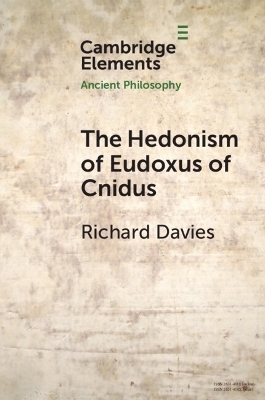
The Hedonism of Eudoxus of Cnidus
Seiten
2023
Cambridge University Press (Verlag)
978-1-009-32151-8 (ISBN)
Cambridge University Press (Verlag)
978-1-009-32151-8 (ISBN)
This Element puts together the arguments of Plato and Aristotle in favor of the positive value of pleasure and in the direction of hedonism. It sets store for the activities which Eudoxus has been most renowned: mathematics and astronomy.
Mathematician and astronomer Eudoxus of Cnidus was a younger contemporary of Plato and an older contemporary of Aristotle, on both of whom he exerted some influence during his stays in Athens. This is perhaps most apparent with regard to his ethical doctrine that identifies the good as pleasure (hedonism). While Plato seems rather unsure how seriously to take this proposal, Aristotle provides the materials for reconstructing the battery of ingenious arguments that Eudoxus brought forward in its defence. Taken together in this Element, these arguments foreshadow almost everything that has been said in the Western tradition in favour of the positive value of pleasure, and, if taken aright, point in the direction of a hedonism that sets store by the cultivation of activities akin to those for which Eudoxus has been most renowned: mathematics and astronomy.
Mathematician and astronomer Eudoxus of Cnidus was a younger contemporary of Plato and an older contemporary of Aristotle, on both of whom he exerted some influence during his stays in Athens. This is perhaps most apparent with regard to his ethical doctrine that identifies the good as pleasure (hedonism). While Plato seems rather unsure how seriously to take this proposal, Aristotle provides the materials for reconstructing the battery of ingenious arguments that Eudoxus brought forward in its defence. Taken together in this Element, these arguments foreshadow almost everything that has been said in the Western tradition in favour of the positive value of pleasure, and, if taken aright, point in the direction of a hedonism that sets store by the cultivation of activities akin to those for which Eudoxus has been most renowned: mathematics and astronomy.
1. Eudoxus: who he?; 2. Two anonymous appearances in Plato; 3. Witness; 4. Addition; 5. Honour; 6. Opposites; 7. Cradle; 8. End; 9. How much did Aristotle accept from Eudoxus?; References.
| Erscheinungsdatum | 12.12.2023 |
|---|---|
| Reihe/Serie | Elements in Ancient Philosophy |
| Zusatzinfo | Worked examples or Exercises |
| Verlagsort | Cambridge |
| Sprache | englisch |
| Maße | 153 x 230 mm |
| Gewicht | 131 g |
| Themenwelt | Geisteswissenschaften ► Philosophie ► Ethik |
| Geisteswissenschaften ► Philosophie ► Sprachphilosophie | |
| ISBN-10 | 1-009-32151-X / 100932151X |
| ISBN-13 | 978-1-009-32151-8 / 9781009321518 |
| Zustand | Neuware |
| Haben Sie eine Frage zum Produkt? |
Mehr entdecken
aus dem Bereich
aus dem Bereich
unsere kollektive Verantwortung
Buch | Hardcover (2023)
wbg Theiss in Wissenschaftliche Buchgesellschaft (WBG) (Verlag)
CHF 46,90


